Fruit News
Veg Lovers aims to tempt new consumers into trying fresh prepared lines by focusing on core, successful products
QV Foods has extended its Veg Lovers brand into prepared produce.
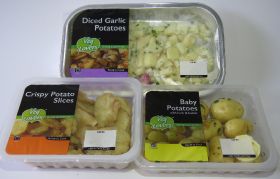
Sister brand to QV Foods’ Potato Lovers range, Veg Lovers aims to encourage and tempt new consumers into trying fresh prepared lines by focusing on “core, successful products” rather than “baffling them with an array of choices”.
The move to establish Veg Lovers comes after QV Foods was tasked by one of its customers to bring a new branded range of fresh prepared vegetables and potatoes to market in less than a month.
The packaging has been designed to try and simply convey the name of the product and its contents, whilst looking good on shelf.
Sales and marketing director Simon Martin: “Everyone at QV worked really closely to create this range. From the pack imagery to the cooking instructions, it’s been a real team effort.
“Since launching, the Veg Lovers’ prepared range has seen astonishing double digit week-on-week growth, meaning that consumers are indeed identifying with the brand and the products.
“QV Foods’ development team plan to ensure that a steady stream of innovative new lines are rolled out into the brand over the course of next year, whilst keeping to the philosophy of focusing on proven formats.”
Research by mySupermarket.co.uk in October also found that a basket of essentials rose slightly from £85.94 to £86.16 in that month
Morrisons has narrowly come out cheapest in a study of grocery essentials for the month of October.

The monthly study, conducted by mySupermarket.co.uk, the shopping and comparison website, monitors the cost of the same 35 most-commonly bought grocery products.
Overall, it found that a basket of essentials rose slightly from £85.94 in September to £86.16 in October.
The October increase was driven by a sharp rise in the cost of broccoli, up 18%, and mushrooms, up 11%. Only apples fell significantly in price, dropping 11% in price compared to September.
The small rise follows a period of falling grocery prices, with the September basket total of £85.94 having been the lowest in 2015.
mySupermarket analysed the basket cost across the top four supermarkets, Tesco, Asda, Sainsbury’s, and Morrisons, plus Waitrose and Ocado, and found significant differences in price.
Morrisons was the cheapest closely followed by Asda. Ocado was most expensive, with Waitrose coming second bottom.
In comparison to a year ago, though, the same basket in October 2014 would have cost shoppers £89.74, a saving of 4%.
Gilad Simhony, CEO of mySupermarket.co.uk, said: “One side effect of the current supermarket price war – the environment in which supermarkets are fighting for shoppers hard earned pounds – is that the cost of grocery staples are being priced very competitively.
“This is great news for shoppers who are looking to make savings. Another side effect, however, is more confusion regarding which of the supermarkets is cheapest as the price of our favourite grocery products can change on a daily basis. Shoppers need to be aware and take control of their weekly shop as the differences in price can be huge.”
Worldwide Fruit aims to double Envy exports
Apple marketer Worldwide Fruit has said it plans to more than double exports of New Zealand apple variety Envy to Asia this year after successfully sending 2.5 containers to Singapore last year.
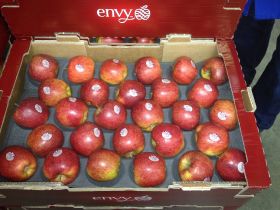
Speaking at last week’s National Fruit Show, Technical Director Tony Harding told the Fresh Produce Journal that the company is taking a different approach this year, by giving growers specific standards for exporting Envy. The aesthetic qualities required by Asian markets, such as colour and skin finish, are different to European customers, he said.
Elsewhere, Harding said Jazz remains a primary focus for Worldwide Fruit and said the variety is performing “extremely well”.
“Jazz is performing extremely well, and it’s ahead of the market with returns and sales. It’s a nice crop from Europe and the UK. It looks very good and eating quality is very high,” he said.
On pears, the company has launched new early blush variety Qtee this year, which crops “very well” and arrives onto the market earlier than Conference. “It’s gone very well, we’ve sold small volumes of UK-grown fruit into Waitrose and some wholesalers. The season has just finished but we have high hopes for the future,” Harding said.
Speaking about the wider top-fruit market, Harding said the market has been “hard work” in recent weeks, although some varieties have bucked the trend.
“It has been particularly tough for red dessert apples and Cox, though other varieties are performing better. There is a strong appetite for Gala and Conference.
“We are trying to improve returns on last year, and so far so good. The value of the crop is reflected in the volumes that are out there.”
Promotional campaign will target UK suppliers and consumers after quinoa imports rose by 50% over one year
The Peru Trade & Investment Office has launched its first campaign to promote Peruvian quinoa in the UK market as imports reach an all time high.

Imports of Peruvian quinoa into the UK rose by 50% between 2013 and 2014, totaling $13 million (£8.5m) last year.
The new campaign will target consumers and industry with information about the varieties of quinoa, particularly red and black, as well as emphasising how quinoa production supports indigenous communities in the Peruvian Andes.
It will also focus on the health attributes of quinoa such as its high protein content and antioxidant levels through engaging with consumer and trade media, bloggers, recipe development and social media, alongside reaching out to UK quinoa suppliers and Peruvian restaurants.
“Quinoa is one of Peru’s most promising exports to the UK market, and the Trade & Investment Office will be supporting it with a promotional push for the first time this year,” said Jaime Cardenas, director of the Peru Trade and Investment Office.
“We have seen an international boom in this protein-rich food, as interest in healthier eating has increased in markets around the world. Here in Britain, this has been accompanied by significant growth in Peruvian cuisine.”
Peru is the world’s largest exporter of quinoa, exporting a total of 36,265 tonnes in 2014, accounting for 45% of world exports, followed by Bolivia with 29,505 tonnes (35%).
Quinoa is indigenous to the Andes region of South America.
Nationwide Produce and Three Musketeers are donating 50p from every box of mint potatoes to support the Poppy Appeal
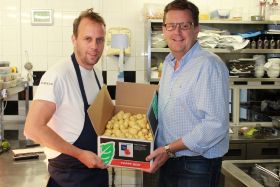
Nationwide Produce and Suffolk potato grower Three Musketeers will donate 50p to The Royal British Legion from every box of mint salad potatoes they sell during the three-week appeal.
After Edward Blanchard from Three Musketeers, and Nationwide’s Tim O’Malley, were moved by visiting Ypres, they decided to replace the mint leaf on packaging with a poppy in aid of the charity.
Backed by Michelin-starred chef Mark Poynton, the ‘Poppy Boxes’ went on sale on Wednesday 21 October at wholesalers and foodservice firms. O’Malley said: “This is a unique opportunity for buyers to support the Poppy Appeal while also backing British farming.
“We’re only five days into this promotion and the uplift in sales would already indicate that the amount we will raise for the Poppy Appeal will be closer to £15,000 than our original estimate of £10,000. The general reaction to this promotion from our customers has been very positive.”
Blanchard said it is “a great honour to help remember those that shouldn’t be forgotten” and asked the produce industry to support the initiative. “Chefs and buyers throughout the country, you can help us to raise some much-needed funds. Simply buy a product you already enjoy or swap from your usual supply and order a ‘Poppy Box’ of our Mint salad potatoes for the first time,” he said.
Sierra Exportadora urges more producers to get involved in lucrative export industry
Peruvian blueberry exports are expected to grow to US$70m in 2015 according to government agency Sierra Exportadora. Chief executive Alfonso Velasquez Tuesta said Peru would close the year with a planted area of 2,800ha.
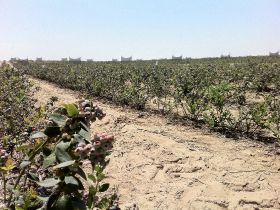
“From zero exports in 2009 to US$30m in 2014, Peru has climbed up the world rankings and is now the tenth biggest exporter of blueberries,” Velasquez said.
The projection is based on the continued strong growth in planted area, an increase in average yields from 8 tonnes to 10 tonnes and the growing number of young plants reaching maturity.
Velasquez noted that if more small producers joined forces to create farms of 25-30ha this would result in a big jump in the country’s blueberry export volume.
The US is the biggest market for fresh blueberries, importing around US$600m last year. This was followed by the UK with US$197m, then Canada and the Netherlands in third and fourth place.
“Peru should be aiming to fill the September-October window between the North American production, season which begins to wind down in August, and the start of the Chilean season in November,” Velasquez said.
On average, Peru produces 10-15 tonnes of blueberries per hectare. Velasquez claimed that since each hectare of production required an investment of US$40,000-US$45,000 and a yield of just 5 tonnes sold at US$10 per kg would generate an income of US$50,000, growers would already cover their start-up costs in one year.
More growth for discount retailers, but Sainsbury’s was the only ‘big four’ retailer to post sales growth over the last month, Kantar data shows
Lidl has achieved a new record share of the UK grocery market.
This is the second successive month Lidl has reached a new share high, and now claims 4.3% of the market, after seeing its growth accelerating to 17.9% in the 3 months to 11 October 2015.
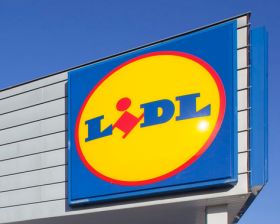
The discount retailer’s growth was particularly strong in Scotland, the scene of its ‘smarter shopping’ card trial.
The latest Kantar Worldpanel data also shows that Aldi saw its revenues rocket by 17.6% compared to last year’s figures.
Sainsbury’s was the only one of the larger supermarkets to see sales growth this period, and a strong performance in its online and c-store channels helped it to increase revenues by 1.1%.
However, Sainsbury’s market share was static at 16.1%.
Sales fell at Tesco by 1.7%, though it is too early to see the impact of its revamped ‘Brand Guarantee’ initiative. At Asda, sales fell by three per cent, bringing its market share down by 0.7 percentage points to 16.6%.
Meanwhile, sales at Morrisons fell by one per cent, taking its grocery market share to 10.8%
Fraser McKevitt, of Kantar Worldpanel, said: “In contrast to the overall market, online grocery sales have increased by 9.8% on last year. Despite this rapid expansion, space for retailers to increase both share and revenue in this area remains, with less than a fifth of households currently shopping online.
“Internet sales offer a chance of long term growth – only 18% of households bought groceries online in the last 12 weeks meaning there’s plenty of space for further expansion. The convenience factor and minimum spend restrictions mean online baskets tend to be larger, averaging £67 in value, compared with £14 for the average bricks and mortar trip.
“Amazon Fresh’s expected full launch early next year could be a major disruptor, bringing down average basket sizes, accommodating on demand shopping, and accelerating the growth of the whole online market.”
There has been further success this period for Waitrose, with sales up by 2.1%; The Co-operative also saw sales grow by one per cent, and Iceland grew for the sixth month in a row, increasing sales by 3.2%, benefitting from a wider range of premium products.
A survey that questioned 115 consumers found Pink Lady was the favoured snack, beating crisps, chocolate and celery
Branded apple Pink Lady has beaten off competition from celery, carrots and milk chocolate to become the nation’s top snack, according to a new consumer survey.
Conducted by Pink Lady brand manager Coregeo, the survey asked 115 consumers to rate snacks for taste, satisfaction, emotion and sensory attributes by either choosing a number on a nine-point scale, or selecting from a list of words that best described their reaction. This was dubbed the ‘Scale of Snackisfaction’ and analysed for qualitative consumer feedback on the different snacking options.
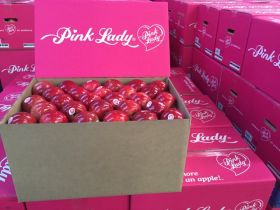
Pink Lady was rated top among consumers, followed by carrots and celery. Other snacks tested were milk chocolate, a shortbread finger, unsalted mixed nuts and crinkle cut ready salted crisps.
The survey forms part of the wider ‘Snackisfaction’ campaign, run by marketing agency MCG on behalf of Coregeo, which aims to position Pink Lady as the snack of choice. It was launched in April following a study from Leatherhead Food Research that demonstrated how subjective emotions such as guilt or excitement can influence the satisfaction rating of a sensory experience.
Other activity has included a ‘Tweet to eat’ roadshow and experiential marketing concept, where consumers could tweet the hashtag #snackisfaction to receive a Pink Lady by post.
During the campaign, 80,000 Pink Lady apples were distributed, coverage generated over 345,500 engagement opportunities on social media and Twitter activity rose by 11 per cent, Coregeo said.
Along with continuous investment in quality control and standards, this targeted consumer marketing has led to Pink Lady seeing a nine per cent year to date growth.
Michelle Toft, Coregeo chief marketing officer, said: “It’s no surprise to us that the Snackisfaction campaign was a huge hit with consumers because Pink Lady is fast becoming the fresh-fruit snacking favourite for the growing number of consumers who recognise its uniquely satisfying combination of taste, texture and refreshing nutritional qualities.
“In fact Pink Lady excelled in terms of tastiness and appearance and overall was more snackisfying than other types of snacks, showing that it’s a serious contender as a satisfying snack.”
A petition aiming for 100,000 signatures is calling for a greater blanket ban of neonics, while a bee species returns to Lincolnshire
Almost 90,000 people have signed a petition calling for the government to clamp down on the neonicotinoid ban following a ruling that allowed four counties to use limited amounts of the pesticide.
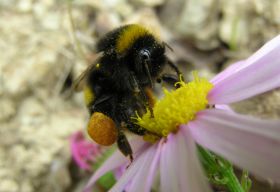
The petition, which wants a complete ban on neonics pesticides to be maintained and enforced by government, will be considered for parliamentary debate if it reaches 100,000 signatures by the closing date which is the end of January 2016.
Three neonics were banned for two years for use on flowering crops in December 2013, following concerns over harmful effects on pollinators.
Farming bodies and other agriculture stakeholders disputed the decision, and this year Defra allowed four counties to use neonicotinoid-treated rape seed following lobbying from the NFU.
The petition is named ‘Don’t kill our bees! Immediately halt the use of neonicotinoids on crops’ and argues that neonics should be banned because they are harmful to pollinators.
The news comes as the Andrena Nitida bee species was spotted in Lincolnshire, after not being seen in the area since 1900.
It was found on a new Syngenta Operation Pollinator habitat area, created by Beeswax Farming, which is owned by hoover tycoon Sir James Dyson.
Bee entomology specialist Mike Edwards described the find as “very encouraging”. “It is very encouraging that habitat creation on farmland is helping some of these solitary bee species to recover in numbers, and to extend their range across the UK,” he said.
“Andrena nitida is one of the many solitary mining bee species that play such an important part in pollinating crops and wildflowers. They look very much like honeybees. However, their behaviour on flowers, and the fact they carry large amounts of dry pollen as they fly from flower to flower, makes them extremely efficient pollinators.”